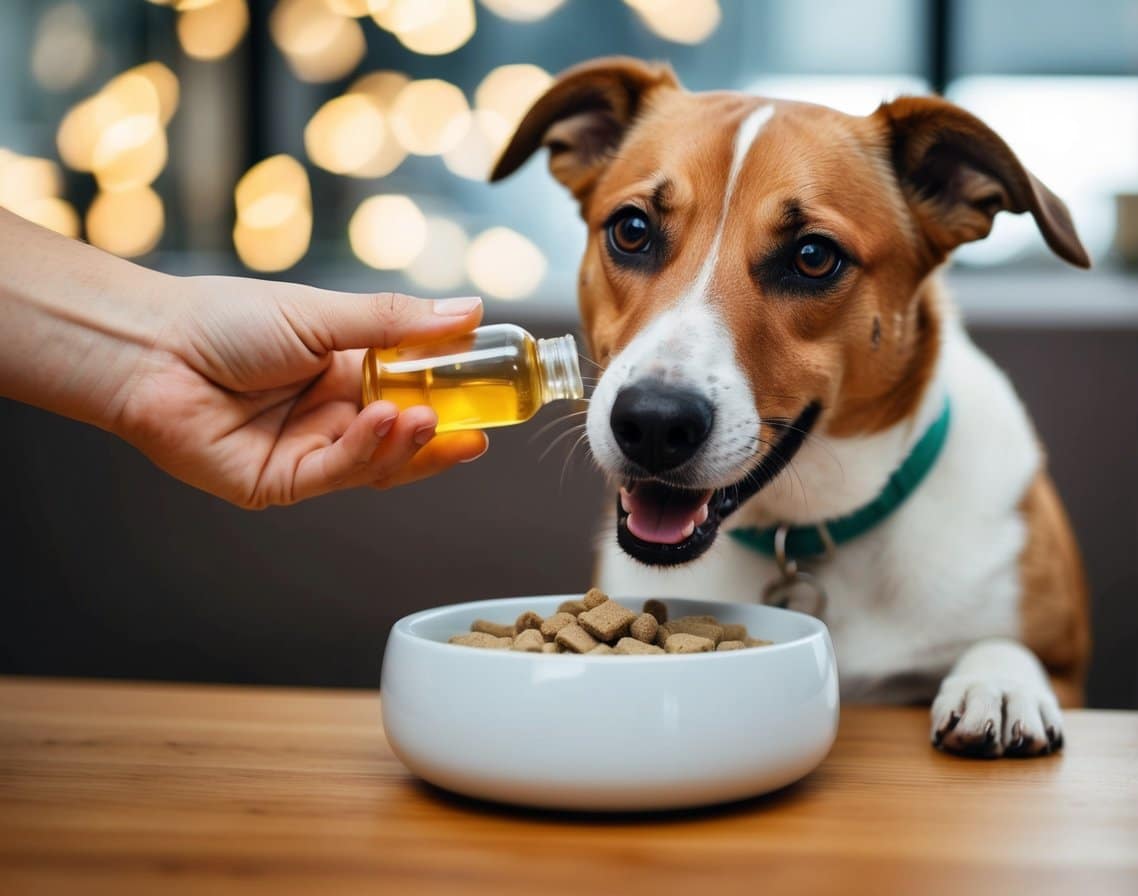
Dogs can feel anxious just like humans do. Your furry friend might show signs of stress through excessive barking, pacing, or destructive behavior. These behaviors often signal deeper emotional struggles that need attention.
Natural remedies and calming solutions can help reduce anxiety in dogs through herbs, supplements, and behavioral techniques without the need for prescription medications. Many pet owners prefer starting with gentle, natural approaches before trying stronger options.
Various natural solutions can help your anxious dog feel more relaxed. From simple training methods to calming supplements, you have many options to explore that could bring peace to your nervous pup.
Key Takeaways
- Natural anxiety treatments work best when combined with consistent training and environmental changes
- Dogs show anxiety through specific behaviors like pacing, drooling, and excessive barking
- Early intervention with gentle remedies can prevent anxiety from becoming severe
Understanding Anxiety in Dogs
Dogs can experience many types of anxiety, just like humans. Signs of anxiety in dogs include excessive drooling, barking, pacing, and destructive behavior.
Common Types of Anxiety:
- Separation anxiety when left alone
- Fear of loud noises like fireworks or thunder
- Stress in new situations or around strangers
- General nervousness throughout the day
Your dog may show anxiety through physical symptoms. Watch for shaking, excessive panting, tucked tail, or hiding behind furniture.
Separation anxiety affects many dogs when their owners leave home. Your pet might follow you from room to room, whine when you prepare to leave, or destroy items while you’re gone.
Anxiety Triggers to Watch For:
- Changes in routine or environment
- Meeting new people or animals
- Car rides
- Vet visits
- Loud or sudden noises
You can often spot anxiety before it gets severe. Look for subtle signs like lip licking, yawning when not tired, or avoiding eye contact.
Noise phobias can cause intense fear in dogs. Your pet might try to escape, hide in small spaces, or become destructive during thunderstorms or fireworks.
Common Natural Remedies for Anxiety
Many effective natural remedies can ease your dog’s anxiety symptoms without prescription medications. These solutions work through different mechanisms to promote calmness and reduce stress.
Herbal Solutions
Valerian root and chamomile are two of the most trusted herbs for calming anxious dogs. These herbs can be given as teas, tinctures, or capsules.
Valerian root helps promote relaxation and better sleep quality in dogs. Give it 30 minutes before stressful events like thunderstorms or vet visits.
Chamomile tea can be added to your dog’s water bowl or food. This gentle herb reduces nervous tension without causing drowsiness.
Other beneficial calming herbs include:
- Passionflower
- Skullcap
- Lemon balm
Aromatic Oils and Scents
Lavender essential oil has proven calming effects on the canine nervous system. Place a few drops on your dog’s bedding or use a diffuser in their rest area.
Never apply essential oils directly to your dog’s skin. Always dilute oils properly and keep them away from their face.
Peppermint can help reduce stress when diffused in small amounts. Use it sparingly as strong scents may overwhelm sensitive dog noses.
Dietary Additions and Supplements
Hemp oil supplements can significantly reduce anxiety in dogs. Start with a small dose and adjust based on your dog’s response.
Key anxiety-fighting supplements include:
- L-theanine
- Melatonin
- B-complex vitamins
- Omega-3 fatty acids
Adding calming foods to your dog’s diet can help:
- Plain yogurt
- Blueberries
- Turkey
- Sweet potatoes
Give supplements with food to prevent stomach upset. Always check with your vet about proper dosing for your dog’s size and health status.
Behavioral and Holistic Approaches

Natural methods can effectively calm anxious dogs without medication. These gentle techniques work with your dog’s body and mind to reduce stress naturally.
Thundershirt and Pressure Wraps
Pressure wraps and anxiety vests apply gentle, constant pressure to your dog’s torso, similar to swaddling a baby. This pressure triggers calming responses in your dog’s nervous system.
The Thundershirt is the most popular pressure wrap brand. Put it on your dog 15-20 minutes before stressful situations like thunderstorms or fireworks.
For best results, introduce the wrap gradually during calm moments. This helps your dog form positive associations with wearing it.
Acupuncture and Chinese Medicine
Traditional Chinese Medicine offers several anxiety treatments for dogs. Acupuncture targets specific points on your dog’s body to release tension and promote relaxation.
Tiny needles stimulate natural pain-relieving chemicals in your dog’s body. Most dogs relax deeply during treatment sessions.
Regular acupuncture sessions can reduce chronic anxiety symptoms. Many dogs show improvement after 4-6 treatments.
Bach Flower Essences
Bach Flower Essences are gentle plant-based remedies that help balance emotional states. Rescue Remedy is the most popular blend for anxious dogs.
Add 2-4 drops to your dog’s water bowl or place directly on their gums or nose. The essences are safe to use multiple times daily during stressful events.
Choose specific flower essences based on your dog’s anxiety symptoms. Mimulus helps fear of known things, while Rock Rose addresses panic and terror.
Creating a Supportive Environment

Your dog needs a quiet, peaceful space to feel safe when anxiety strikes. Create a dedicated area with soft blankets and their favorite bed.
Keep calming music playing in the background. Classical music or specially designed pet music can help reduce stress levels.
Essential items for a calming space:
- Comfortable bed or crate
- Favorite toys
- White noise machine
- Dim lighting
- Cozy blankets
Aromatherapy with lavender or chamomile can create a soothing atmosphere. Use a pet-safe diffuser placed away from your dog’s direct access.
Look for signs that trigger your pet’s anxiety. Common triggers include loud noises, strangers, or being left alone. Once you identify these, you can adjust the environment to minimize exposure.
Block outside noise by closing windows and using heavy curtains during storms or fireworks. This simple step makes a big difference for noise-sensitive dogs.
Give your dog a view of the outdoors through a window, but use barriers if outdoor activity causes stress. This helps them feel connected while staying protected from triggers.
Remember to maintain a consistent daily routine. Regular feeding times, walks, and playtime help your dog feel secure and reduce anxiety.
Integrating Solutions for Optimal Results

Using multiple natural remedies together can create a stronger calming effect for your anxious dog. Natural calming solutions work best when combined thoughtfully.
Start with one remedy, like CBD oil or chamomile, and watch how your dog responds. After a few days, you can add another option if needed.
Exercise and training should be part of your approach. A tired, well-trained dog often shows less anxiety. Take your dog for walks or play fetch before situations that typically cause stress.
L-theanine and melatonin can be used together safely. The standard dose is 6mg per 10 pounds of body weight, given twice daily.
Create a calming environment at home:
- Soft music
- Dim lights
- Cozy bedding
- Quiet spaces
Watch for these signs that the remedies are working:
- Less pacing
- Reduced barking
- Normal eating habits
- Better sleep
CBD products have become popular for dog anxiety. You can combine CBD with other gentle remedies like lavender scents or calming wraps.
Remember to talk with your vet before starting any new treatments. They can help you create the right combination for your dog’s specific needs.
Frequently Asked Questions

Natural remedies and treatments offer effective options for managing dog anxiety, from herbal supplements to behavioral techniques. Pet owners can safely address anxiety symptoms through various approaches while working closely with veterinarians.
What are the most effective natural remedies for managing anxiety in dogs?
CBD oil helps calm anxious dogs and has become increasingly popular among pet owners.
Anxiety relief chews with chamomile, L-theanine, and melatonin can reduce nervousness and stress in dogs.
Kava Kava works especially well for restless dogs and can be added to food or water as a tincture or powder.
Are there any side effects associated with natural anxiety medications for dogs?
Most natural remedies have minimal side effects when used as directed. You should start with small doses and monitor your dog’s response.
Some dogs may experience mild drowsiness or digestive changes when first starting natural supplements.
Can over-the-counter natural treatments be safely used to reduce anxiety in dogs?
Many natural calming supplements are safe for dogs when purchased from reputable manufacturers. Always check the ingredients and dosage instructions carefully.
Start with the lowest recommended dose to see how your dog responds.
How do natural calming aids for dogs compare to traditional anti-anxiety medications?
Natural remedies typically work more gradually and may be better suited for mild to moderate anxiety cases. They often have fewer side effects than prescription medications.
Traditional medications may work faster and provide stronger relief for severe anxiety cases.
What are some quick techniques to alleviate stress in an anxious dog?
Creating a quiet, safe space helps your dog feel secure during stressful situations. Playing calming music can help reduce anxiety quickly.
Gentle massage and pressure wraps provide immediate comfort for many anxious dogs.
In what situations should a veterinarian be consulted for a dog’s anxiety treatment?
Seek veterinary care if your dog shows severe anxiety symptoms like excessive barking, destructive behavior, or aggression.
Contact your vet if natural remedies aren’t providing adequate relief after several weeks of use.
A professional evaluation is essential if your dog’s anxiety interferes with daily activities or quality of life.





